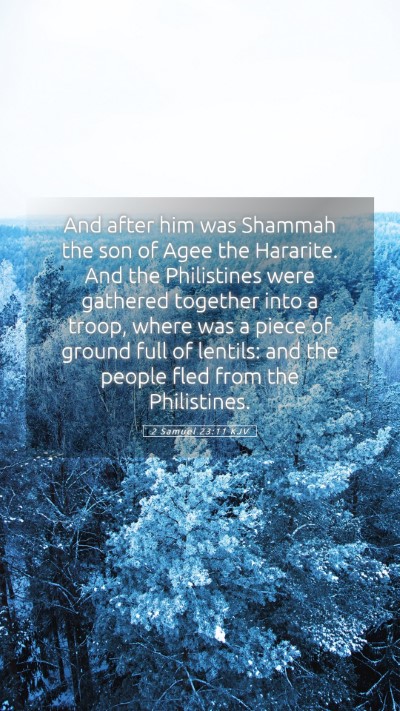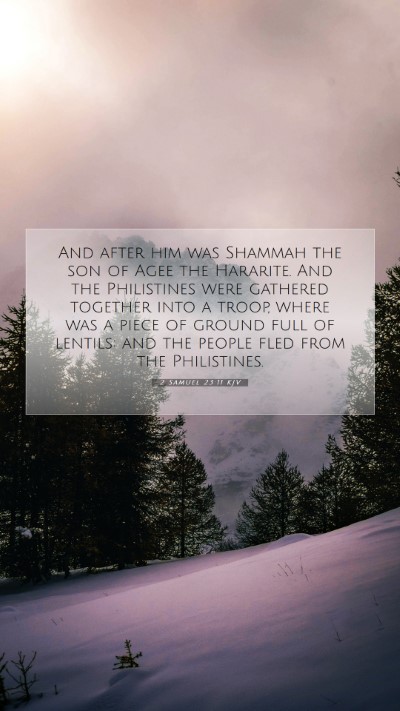Understanding 2 Samuel 23:11 - Bible Verse Commentary
2 Samuel 23:11 states: "And after him was Shammah the son of Agee the Hararite. And the Philistines were gathered together into a troop, where was a piece of ground full of lentils: and the people fled from the Philistines."
This verse presents the valor and determination of Shammah, one of David’s mighty warriors, who stood his ground to defend a field of lentils against the Philistines, showcasing themes of courage, loyalty, and faithfulness.
Verse Insights from Public Domain Commentaries
-
Matthew Henry's Commentary:
Matthew Henry emphasizes the courage of Shammah in this passage. He explains that in times of dire circumstances, Shammah remained steadfast, demonstrating that even seemingly insignificant battles for mundane resources can hold great significance. The lentil field stands as a metaphor for the importance of small victories in the broader context of faith and commitment. Henry also highlights that true bravery often emerges in moments where one is forsaken by others, illustrating the essence of moral integrity.
-
Albert Barnes' Notes:
Barnes delves into the historical context, indicating that the Philistines were a recurrent enemy of Israel. He notes that Shammah's defense of the lentil field was not merely about crops but revealed a larger spiritual truth: the fight against evil forces. He asserts that Shammah embodies the idea of taking a stand for righteousness, drawing parallels with the Christian call to defend one’s faith. Barnes encourages readers to see this account as an example of standing firm in faith when faced with overwhelming odds.
-
Adam Clarke's Commentary:
Adam Clarke points out that Shammah's action to protect the field signifies the need for preservation of basic resources to sustain life. Clarke interprets the field of lentils as symbolic of spiritual sustenance necessary for the community. He notes that the field represents the mortal struggle between good and evil and highlights the significance of fighting for one’s sustenance. Clarke also underscores the disregard many had for Shammah’s cause, yet he stood firm, providing a lesson in faithfulness despite adversity.
Spiritual Applications and Reflections
The narrative of Shammah invites readers to reflect on personal battles in their own lives. It serves as a metaphor for standing firm in one's beliefs, even when facing societal pressures or abandonment. The lentil field represents vital aspects of life—faith, values, and relationships—that require protection against external challenges.
Faithfulness in Adversity
- Shammah serves as a model of unwavering faith; we are encouraged to stand firm in our convictions and protect our spiritual well-being.
- The verse calls out to individuals to contemplate what "fields" in their lives need defending, be it faith, moral standards, or community values.
- In daily life, this scripture urges believers to evaluate where they might need to assert their presence against the forces that seek to undermine their convictions.
Cross References
- 1 Samuel 17:47 - King David’s battle with Goliath demonstrates reliance on God for victory.
- 2 Timothy 4:7 - Paul speaking of having fought the good fight reflects the enduring spirit akin to Shammah's dedication.
- Ephesians 6:13 - "Put on the whole armor of God," illustrating the importance of preparation and resilience in spiritual battles.
Conclusion
The story encapsulated in 2 Samuel 23:11 stands as a timeless reminder of the importance of standing firm in one's faith under adversity. It highlights that each battle, however small, contributes to the larger narrative of spiritual warfare, encouraging believers to reflect on the significance of their own struggles and triumphs in the pursuit of righteousness.


